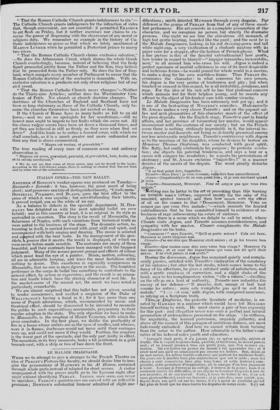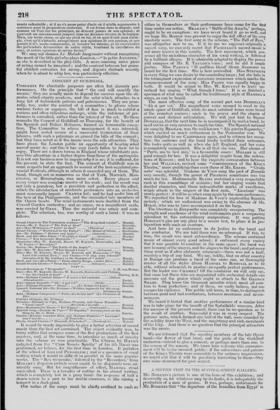LE MALADE IMAGINAIRE.
WERE we to attempt to give a stranger to the French Theatre an idea of PERLET'S Proteus-like faculty, we should desire him to ima- gine the personations of MarnEws ill his At Homes, sustained through whole parts instead Of adopted for short scenes. A visitor unacquainted with the pieces might go to the Lyceum night after night without identifying PERLET. LISTON, once seen, can never be mistaken ; FARREN'S quaintnesses are carved with an inflexible precision ; Dowrozi's substantial humour admitted of slight mo- difications ; mirth detected MUNDEN through every disguise. Far different is the genius of PERLET from that of any of these excel- lent performers. His art consists in a complete assumption of the character, and we recognize no person but strictly the dramatis' persona. One night we see him the chivalrous old monarch, of high but gentle bearing, bearded like the pard ; and the next he is the Malade Imaginaire, looking, in his red dressing-gown aid tall white night-cap, a very vivification of a rhubarb mixture with its paper cone for a stopper, after the fashion of French physic. What a fine picture is this of the fanciful valetudinarian ! how genttle.„ how tender in regard to himself—" impiger iracundus, inexorabilis„ acer," to all around him who cross his will. Argun is indeed.a perfect specimen of morbid selfishness in one of its most despicable and ludicrous forms—he would pound the whole world in a mortar,. to make a druo.h for his own worthless frame. Thus PERLET dis- criminates the character : in what concerns his own person, his Argun is the very genius of tenderness and pity ; but when touched or crossed in this regard, he is all irritability, petulance, and rage. For the idea of his sick self he has that profound concern: which animals feel for their helpless young, and he resents any affront to the object of his fondest care with similar vivacity. Le Ma/ode Imoginaire has been extremely well got up ; and it is one of the best-acting of Mousia's comedies. Mademoiselle St. ANGES makes a very clever Toinette ; and on the piquant sal- lies and arch pleasantries of this character much of the effect of the piece depends. On the English stage, Toinette's part in family affairs, and her province of tormenting her master, would appear inconsistent with the customs of our society ; but on the French scene there is nothing strikingly improbable in it, the interval be- tween master and domestic not being so di,tantly preserved among our less aristocratic neighbours. Toinette's controversy with Argam as to the marriage of his daughter, whom he designs to bestow on Monsieur Thomas Diafoirus, was conducted with great spirit She flatly, but coolly contradicts his purpose ; he protests resolu- tion ; she objects his paternal tenderness, and says a tear or a caress will conquer his resolution ; he repeats his protestations of obstinacy; and St. ANGES exclaims " bagatelles !" in a manner decisive of the merits of the dispute. The word greatly disturbs Argon .
• -" II ne faut point dire, bagatelles. ^ Toinette—Mon Dieu! je vous connais, yam etes bon naturellement. Argan—(impatiently)—Je ne suis point bon ; et je suis mechant (pawl
je veux. : .. •
• Toinette—Doucement, Pfou,v ne songez pas que vous etes mAule." • °thing can be better in the art'of provoking than this turning an irritable mans virtues, supposed merely for the sake of the mischief, against himself; and then how muoh with the effect of oil on fire comes in that .`Doucement, Monsieur. Vons ne songez pas que vous etes malade ; "—which reminds the fancied valetudinarian that he has committed himself to evidences of ro- bustness of rage unbeseeming his estate of sickness. Again there is a scene which we delight to call to mind, where Cleante visits Argon, and Toinette assumes considerateness, and sympathy with her master. Cleante compliments the Maack lmaginatre on his looks.
" Comment !" says Toinette, " Qu'il se Forte mieux ? Cela est faux. Monsieur se porte toujours mat.
. 'Clearite—J'ai oui dire que Monsieur etoit mieux ; et je lui trouve bon visage. Toinette—Que voulez-vous dire avec votre bon visage ? Monsieur l'a fort mauvais ; et cc sont des impertinens qui vous ont dit qu'il 6toit mieux. II ne s'est jamais Si mai porte."
During the discussion, Argun has remained quietly and compla- cently passive, satisfied with Toi nette's vindication of the constancy of his sickness ; but after the last stroke, which comes home to the fancy of his affections, he gives a subdued smile of satisfaction, and with a gentle emphasis of correction, and a sligjlt shake of the head, says to his complimentary visitor, " elle a raison,"—dwelling on the elle as on a host of authority, Toinette now redoubles the energy of her defence—" 11 marche, dort, mange 'et boit tout comme les autres ; mais cela ifemptiche pas gull ne soit fort malade." "tin est vrai," adds Argun, with composed assurance, as relying on a Scripture truth. Thor44s 'piafoirus, the pedantic licentiate of medicine, is en- acted by GAMARD in a manner which would have left MOLIERE himself nothing to wish. He must starve a pair of legs expressly for this part : and altogether never was such a perfect and natural personation of awkwardness presented on the sta7e. 'i he stiffness, the angularity, the learned pretension, ungainly gallantry, and above all the conceit of this paragon of ambitious dulness, are most ludicrously embodied. And here we cannot refrain from turning from the actor to the author. How admirable is the father's nar- rative of his beloved cub's youth and education.
" Lorsqu'il etoit petit, il n'a janiais 6t6, cc qu'on appelle, mievre et &eine. On le voyoit toujours duux, paisible, et taciturne, ne disantjamais mot ; et ne jouant jamais a tons ces petits jeux, que l'on nornme en- fantins. On eut toutes les peines du monde a lui apprendre lire ; et il avoit neuf ans qu'il no connoissoit pas encore scs lettres. Bon, disois-je en moi- mime, les arbres tard ifs sont ceux qui portent les meillcurs fruits. On grave sur le marbre hien plus malaisement que sur le sable ; mais les choses y sont conservees bien plus long tems, et cette lenteur a corn- prendre, cette pcsanteur d'imagination, est la marque d'un bon jugement venir. Lorsque je l'envoyai an college, ii trouva de la peine ; mais il se roidissoit contra les difficultes, et Fes regens se louoient toujours moi de son assiduit6, et de son travail. Enfin, b. force de battre le fer, il en est venu glorieusttlient a avoir ses licences ; et je puts dire, sans vanite, que, depuis deux ans qu'il est sur les banes, ii n'y a point de candidat qui ait fait plus de bruit que lui dans toutes les disputes de notre ecole. s'y est rendu redoutable ; et il ne s'y passe point d'acte oil ii n'aille argumenter outrance pour la proposition contraire. Ii est ferme dens la dispute, sort comme un 'lure sur ses principes, ne dernord jamais de son opinion ; et poursuit un raisonnement jusques dans les derniers recoins de la logique. Mais, sur toute chose, ce qui me plait en lui, et en quoi il suit moo exem- ple, c'est qu'il s'attache aveuglement aux opinions de nos anciens, et que jamais ii n'a voulu comprendre, ni &outer les raisons, et les experiences des pretendues decouvertes de notre chicle, touchant la circulation du sang, et autres opinions de mi:me farine." We may not dismiss Le Malade Imaginaire without recognizing the merit of the little girl who plays Louison,—" la petite ANNETTE," as she is described in the play-bills. A more amusing naïve piece of acting cannot be imagined; and the contrast between her grace- ful childish entreaties for mercy, and Argan's rhubarb seventy when he is about to whip her, was particularly effective.



















 Previous page
Previous page